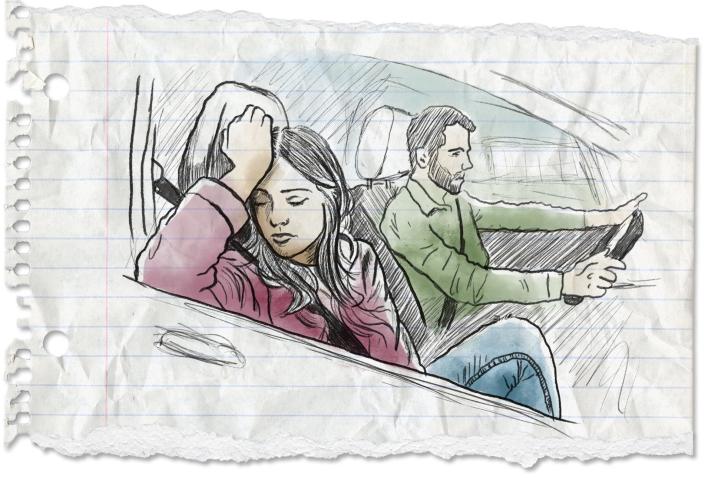Is the United States youth’s school avoidance becoming a mental health crisis?
The police were in her driveway. They wanted her son.
Jayne Demsky’s teenage son was not a criminal. He never stole, used illegal substances, or physically hurt anyone. He just didn’t go to school.
It started in the middle of 6th grade when he began staying home from school on days his anxiety was too difficult to manage. Those days became more frequent, turning into weeks and months, until he stopped going altogether. Now an officer was at her house, waiting to take her son to school.
“I would describe it as hell,” said the mother from Mahwah, New Jersey, who recalled feeling hopeless and constantly “on the verge of an emotional breakdown.”
Demsky sought help from educators, doctors and counselors, trying to understand what was stopping her son from going to school for nearly a year. Finally, a psychiatrist told Demsky about a condition that affects a growing number of students with severe anxiety: school avoidance.
“It was almost like a revelation,” she told USA TODAY.
School avoidant behavior, also called school refusal, is when a school-age child refuses to attend school or has difficulty being in school for the entire day. Several mental health experts told USA TODAY it has become a crisis that has gotten worse since the COVID-19 pandemic.
“There’s no book on this, it’s not spoken about,” said Demsky, whose son declined to be interviewed by USA TODAY but gave his mother permission to share their story. “It’s very scary and parents feel a sense of helplessness.”
The two continued to struggle with school avoidance for four years with little guidance. In 2014, she created a website to offer families the help and support she couldn’t find. The site eventually turned into the School Avoidance Alliance, which spreads awareness and educates learning facilities and families of school avoidant children.

School avoidance is not a concrete diagnosis and looks different in every child. Some students consistently miss a couple of days a week, while others may leave during the day or escape to the nurse or counselor’s office. In some extreme cases, students don’t step foot in a school for months or years at a time.
Half a dozen family members and students told USA TODAY that school avoidance has affected not only their mental health, often leading to anxiety and depression, but also their family dynamics, relationships with fellow students, and grades. It has threatened their prospects of graduation and a thriving future.
School avoidance is a complicated condition that neither parents nor school systems are fully equipped to handle. Some experts say school systems and national organizations are beginning to come up with strategies to get kids back to school, while others wonder if there’s a better answer.
“Our waiting list is like 180 families right now,” said Jonathan Dalton, a licensed psychologist who runs the Center for Anxiety and Behavioral Change in Maryland and Virginia, which offers treatment to those affected by anxiety and other related disorders, including school avoidance. “The mental health infrastructure was never designed for this level of need.”
‘Anxiety and avoidance are teammates’
In the passenger seat of her mother’s car, Anna saw the school slowly peek above the horizon. Her heart began racing, her body shaking. Her breathing grew shallow and fast. And then, the unmistakable sign of her panic attacks: her hand smacking her leg.
“It’s scary because it’s not voluntary at all. It’s just kind of happening to you,” said Anna, a Virginia college student who spoke on the condition that she not be fully named because of mental health stigma. “I’ll sit in the car and tell myself to go in, but my body won’t carry me inside.”
Anna, who was school-avoidant in 10th grade, said her school avoidance began spiraling after she recovered from a medical condition. Despite getting better, she hadn’t been to school in a month, and the mere thought of returning generated anxiety.

For most students, mental health experts say, school avoidance is typically a symptom of a bigger problem: anxiety.
“Anxiety and avoidance are teammates because they work on the same function,” Dalton said. “Kids feel very uncomfortable when they go to school or think about going to school, so they do what evolution teaches them to do and avoid something that makes them scared.”
Anxiety may be a common thread, but the basis of that fear varies with each student, said R. Meredith Elkins, program co-director of the McLean Anxiety Mastery Program at McLean Hospital in Massachusetts.
School avoidant behaviors most often occur in the transition between elementary, middle school and high school, she said.
“In younger children, we’re more likely to see school avoidance motivated by separation anxiety,” Elkins said. “As kids get older and their social environment changes, the way they interact with peers becomes important, and we see social anxiety as a more frequent contributor.”
School avoidance also tends to be a gradual process – starting with missing a day or two, then missing a week until the student becomes school avoidant altogether. The longer a student is away from school, the harder it is to get them back into school, and it can affect other aspects of their life, like relationships and work opportunities, Dalton said.
“We don’t call it work refusal, we call it unemployment,” he said. “If (students avoid school) and gain short-term relief, they’ll become a master of avoidance, and that doesn’t play well for the future.”
CLICK HERE TO READ THE FULL ARTICLE ON USA TODAY
TYT Newsroom


